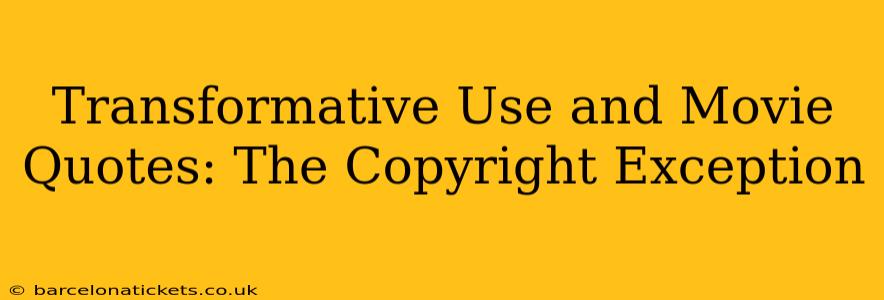The use of movie quotes, seemingly innocuous snippets of dialogue from our favorite films, can surprisingly navigate complex legal waters. Copyright law protects these quotes as part of the copyrighted work, but the doctrine of "transformative use" offers a potential exception. This article delves into the intricacies of transformative use as it applies to movie quotes, exploring its meaning, limitations, and practical applications. We'll examine how courts approach these cases and offer guidance for navigating this legal landscape.
What is Transformative Use?
Transformative use is a legal defense against copyright infringement. It argues that a new work using copyrighted material doesn't merely reproduce the original but instead transforms it into something new and different, adding a new expression, message, or meaning. The key is whether the new work presents the copyrighted material in a way that alters its purpose or character. This isn't just about adding a few changes; it involves a fundamental shift in the overall work's purpose and expression. A simple alteration isn't enough; the use must add something new, with a further purpose or different character, altering the first with new expression, meaning, or message.
Does Fair Use Apply to Movie Quotes?
While transformative use is a key element, it's often considered under the broader umbrella of "fair use." Fair use is a legal doctrine in the US that permits limited use of copyrighted material without permission from the copyright holder. Determining fair use involves a four-factor test:
- The purpose and character of the use: Is the use transformative? Does it serve a different purpose than the original?
- The nature of the copyrighted work: Is the original work primarily factual or creative? Creative works receive stronger copyright protection.
- The amount and substantiality of the portion used: How much of the original work is used? Using a small portion is more likely to be considered fair use than using a large portion.
- The effect of the use upon the potential market for or value of the copyrighted work: Does the use harm the market for the original work? If the new work competes with the original, it's less likely to be considered fair use.
Applying this to movie quotes, using a single iconic line in a critical essay is far more likely to be considered fair use than using extensive dialogue excerpts to create a derivative work.
How Much of a Movie Quote Can I Use?
There's no magic number of words or characters that defines permissible use. The courts look at the overall context. Using a short, iconic quote within a larger work that significantly transforms its meaning is more likely to be considered fair use than using a lengthy passage with minimal alteration. The amount used is just one factor in the overall fair use analysis. Quality trumps quantity. The more crucial a section is to the original work’s meaning, the less likely its use will be seen as fair.
What if I'm Using Movie Quotes for Commentary or Criticism?
Using movie quotes for commentary or criticism is often seen as transformative. A film critic, for instance, might use quotes to illustrate their points about the film's themes, style, or character development. This use adds a new expression, analysis, and interpretation—demonstrating transformative use. However, the amount and context of the quote are crucial here as well. Using extensive dialogue excerpts without adding a new perspective would weaken this defense.
What about Parodies?
Parodies often rely heavily on copyrighted material, but the transformative nature of parody usually outweighs the use of the original material. The key here is whether the new work comments on or critiques the original work, adding humor or satire. A successful parody transforms the original's meaning and purpose, creating something new and distinct.
Can I Use Movie Quotes in My Commercial Work?
Using movie quotes in commercial projects is a riskier proposition. The commercial use factor in the fair use test often weighs against the user. A company using a movie quote to sell a product without adding a transformative element is highly unlikely to be deemed fair use.
What are the Potential Consequences of Copyright Infringement?
Using movie quotes without permission or a valid legal defense can result in significant consequences. Copyright holders can sue for infringement, seeking monetary damages and injunctions to stop the use. Damages can be substantial, potentially including profits made from the infringing use.
This information is for educational purposes only and does not constitute legal advice. Consult with a legal professional for guidance on specific situations. Navigating copyright law is complex, and understanding transformative use is a critical part of using copyrighted material responsibly.

